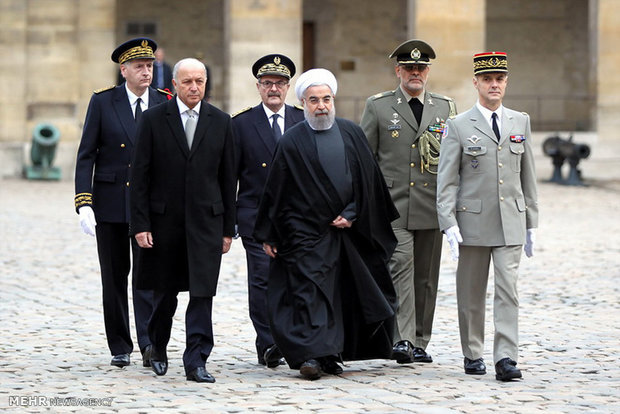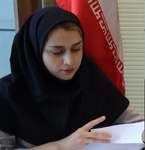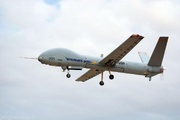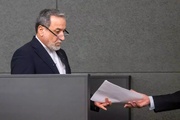Tehran-Rome and Tehran-Paris relations have gone through many ups and downs in the past, especially after the imposition of West and US illegal sanctions against the Islamic Republic of Iran.
In his first European trip, Rouhani and his 120-strong delegation of business leaders and ministers, seek to provide the grounds and a wide range of opportunities to foster cooperation between Iran and European countries under the so-called landmark agreement JCPOA, officially came into effect on 16 January.
On his first stop on a five-day European trip, President Rouhani arrived in Rome on Monday, January 25, and was initially greeted by Italian Foreign Minister Paolo Gentiloni at the international Rome Ciampino Airport and then was officially welcomed by Italian President Sergio Mattarella.

Iran’s President Hassan Rouhani and Italian Prime Minister Matteo Renzi attended a presse conference on January 26 exchanging views on, and covering a wide range of issues, including the capacity of extensive bilateral cooperation between Tehran and Rome, unfair anti-Iran sanctions hindering the development of bilateral ties, Iran’s highly significant situation in terms of security, energy, human resources, human development and geopolitics and Iran’s diplomacy as the best way to sustainable peace.
On January 26, both sides signed the contracts in Rome late Monday which was worth up to 17 billion euros ($18.4 billion) in sectors from energy to infrastructure and from steel to shipbuilding and healthcare.
On the same day, Iranian Minister of Agriculture Mahmoud Hojjati and his Italian counterpart Maurizio Martina, Italy’s Minister of Agricultural, Food and Forestry Policies inked a Memorandum of Understanding (MoU) in the field of plant protection, according to which the two countries agree to expand scientific, research and practical collaborations in the areas of supervision, prevention and control of pests and to exchange of expertise and experience, as well as, facilitation of trade of agricultural and horticultural crops through effective and efficient communication between regulatory and quarantine agencies of the two sides.
Iranian President attended Iran-Italy business forum in Rome on Tuesday, January 27, to discuss ways to boost bilateral trade after JCPOA implementation in Rome and to look for paving the way for further and better economic, scientific and cultural cooperation between the two countries.
Rouhani underlined during the meeting that, “We wish to have at least 30 percent of our products exported abroad.”
Mr. Rouhani also met with Pope Francis in Vatican and touched upon Iran’s nuclear deal with west and its recent implementation, Middle East developments, the political solutions to the crisis underway in the region and the role of religions in promoting peace and avoidance of violence and extremism. They called all countries to work in a collective attempt to establish peace across the globe.

During the last hours of Iranian delegation’s stay in Italy, President Rouhani held a meeting with Iranians in the European country and made remarks regarding Iran’s significant role in combating terrorism in the region, Iranian’s resilience against Western illegally imposed sanctions and Leader's helpful guidance during insufferable days of nuclear negotiations. He also attended a press conference during which he underlined Iran would pursue close relations with Italy in line with the 14 MoUs which were signed by the two sides’ top-ranked officials in scientific, transport and technology fields.
Iran’s CBI governor also met and talked with Guido Rosa, member of the Committee of the ABI Presidency for international relations.
Marking the end of President Rouhani’s trip to Italy, The Islamic Republic of Iran and the Republic of Italy issued a joint statement and determined a road-map of development of Tehran-Rome ties in political, economic, cultural, tourism, scientific, and technological fields on January 27.
On second leg of his European trip, President Rouhani arrived in Paris on Wednesday, January 28 and was officially welcomed by Laurent Fabius, French Minister of Foreign Affairs, in Les Invalid Palace of Paris.
President Rouhani held a meeting with Iranians in Paris discussing several regional and international issues, and also with representatives and managers of French business tycoons and great industry managers discussing the economic opportunities in Paris on same evening.
During the high-profile event, where the heads of Total, Airbus, Orange, Peugeot Citroen, and other great industries were attending, Dr. Rouhani said Iran welcomes French participation in its economic sectors which will provide safe profits and receive guarantees. Emmanuel Macron, French Minister of Economy, Industry and Digital Affairs expressed the willingness of France’s all great companies active in economic infrastructure, airport, railroad, and energy sectors to participate in Iran’s strategic and regional markets.
Afterwards, President Rouhani had a meeting with Director-General of UNESCO Irina Bokova, Total CEO Patrick Pouyanné, Tom Enders and Chief Executive Officer of Airbus Group.

Iran and France sealed a new oil contract in Paris following the recent agreement between the National Iranian Oil Company (NIOC) and France’s Total on selling 150 to 200 barrels of crude oil to the French company.
Iranian private firm and France’s Axens Group also inked an MoU over buying required catalysts for petrochemical and refinery complexes, and agreed to cooperate under a common brand in order to meet domestic needs as well as to exports joint productions to regional countries.
On January 28, President Rouhani and Manuel Carlos Valls, French Prime Minister, attended Iran-France economic session held with other French businessmen and cabinet members to improve relations of both public and private sectors of economy in the two countries which was is a good start to extend political relations and consolidate trade in line with common economic interests.
In the meeting, Iran and France signed three MoUs in automaking, health, and agriculture between private sectors. French prime minister noted that sanctions on Iran’s economy inflicted most damage to French economy.
Rouhani and his French counterpart Francois Hollande attended a joint press conference at the Elysee Palace early Thursday January 28 and exchanged views on taking advantage of post-sanction conditions in order to expand joint cooperation and compensate for the lost opportunities. On Thursday evening, Rouhani sat down for talks with Hollande and oversaw the signing of over 20 memorandums of understanding in various sectors, including telecommunications, environment, tourism, agriculture, higher education and transportation.

Islamic Republic of Iran Shipping Line (IRISL) and French CMA-CGM Shipping signed an agreement on January 28, extending cooperation into areas of exchange of container space, organizing joint services in international shipping lines, and trade of containers in lines which would benefit both sides’ mutual interests.
The European visit was Rouhani’s first foreign trip after the nuclear deal between Tehran and the Group 5+1 took effect on January 16.
Delighted over Euro tours economic and political achievements, Rouhani underlined his visit to Europe marks a “new spring” in his country’s relationship with the European Union that should help thaw tensions after years of Western sanctions over Iran’s nuclear program.



























Your Comment